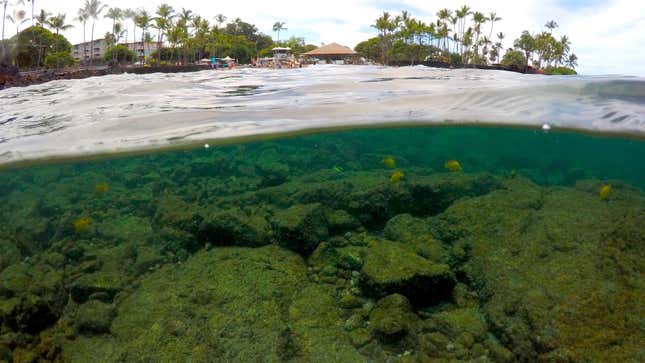
Climate change is taking a toll on the ocean, and people are racing to save the seas. But a new study shows exactly who’s to blame for their crash. And no, it’s not consumers. It’s major fossil fuel producers: BP, Chevron, ExxonMobil, and Royal Dutch Shell.
The study, published Wednesday in the journal Environmental Research Letters, takes a look at ocean acidification and attributes exactly how much Big Oil has contributed to it.
Ocean acidification is the result of excess carbon dioxide in the atmosphere. As oceans absorb it, chemical reactions occur and cause pH levels to drop. Marine organisms with shells or exoskeletons—like shellfish or corals—struggle to survive in more acidic waters, putting stress on entire ecosystems at risk of collapsing.
To divvy up the blame of what companies are to blame for ocean acidifcation, the team of authors, which include researchers with the Union of Concerned Scientists and the Woods Hole Oceanographic Institution, analyzed different periods of ocean acidification. They looked at a periods from 1880 to 2015, the era we began emitting carbon, and 1965 to 2015, when fossil fuel companies knew the impacts of their devilish ways. Because carbon dioxide enters the atmosphere quite rapidly and contributes to global ecological distress no matter where the emissions originate, the scientists looked at how these overall emissions affected oceans worldwide.
The findings show that the 88 largest industrial producers of carbon—the ones who extracted coal, oil, and gas throughout history and then sold consumers it—have contributed to roughly half of the historical pH reduction in our oceans. The point of this endeavor was, in part, to gain a sense of what the world would look like today had these major emitters had acted on what some began to understand in the 1960s, author Scott Christopher Doney, a professor of environmental sciences at the University of Virginia, told Earther. Corporations like Exxon and even the coal industry knew back then that peddling and burning fossil fuels were detrimental to the planet. And yet instead of alerting the world and producing less, they invested in climate denial to keep profits flowing.
“The question is: Could we have, with the knowledge that was at hand in the 1960s, could we have started down a different path ?” Doney said.
To answer that question, the researchers also ran simulations where they subtracted the emissions of the 88 major carbon polluters from the world’s overall emissions to see how the oceans would look, otherwise. The effect was clear: Ocean acidification would not be the massive issue it is now had these entities taken action on the science they knew in the late 20th century.
Now we’ve gone so far down this path of guzzling fossil fuels and emitting carbon that weaning ourselves off it ain’t so easy. That’s what world leaders are contending with at the international climate talks in Madrid where oceans are finally getting some attention. All these decades-long delays make saving the world that much harder.
I’d argue the blame falls on the companies that truly understood what was at stake. And Doney said he doesn’t want to turn this on the consumers who bought the fossil fuels these companies were selling. We work with what we’ve got—and we haven’t many affordable, effective alternatives for much of human history.
“[W]e need to make decisions as a society about how to deal with climate change,” Doney said.
That means drawing down emissions rapidly. But the way Doney sees it, these decisions also need to start involving adaptation. Ocean acidification is already a problem. Though we can stop it from worsening, it’s crucial for leaders to start working with the coastal communities that are losing their fisheries and coral reefs as a result to find solutions now.